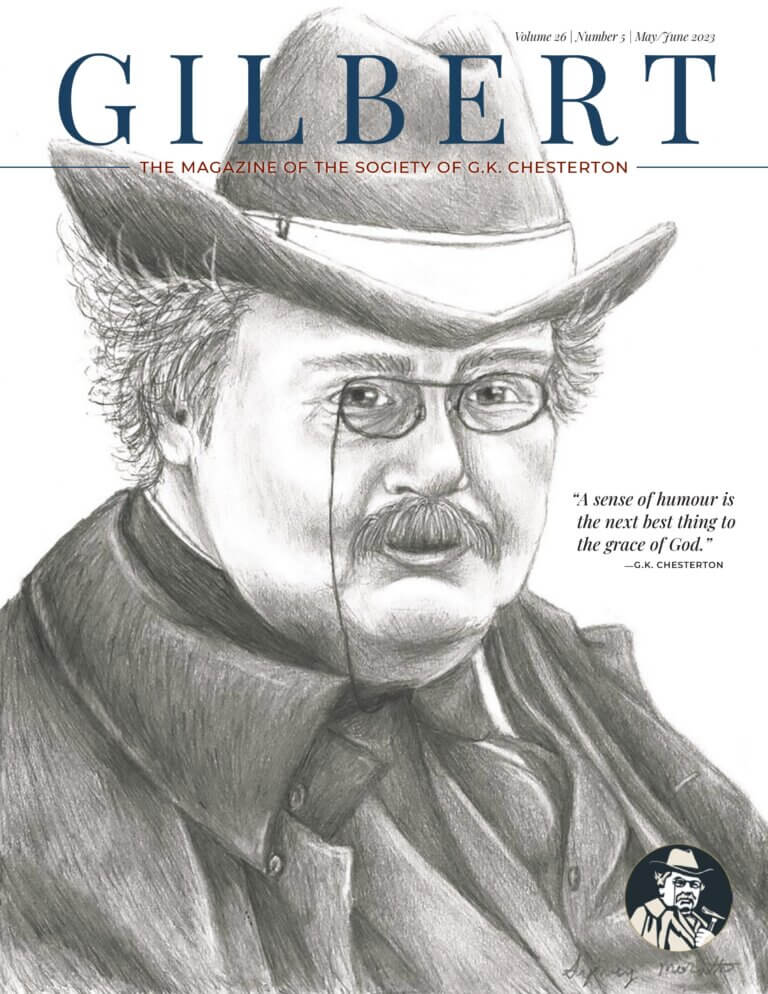We are nearly a quarter of the way into the 21st century. It might be a little too early to sum it up. But G.K. Chesterton was already trying to sum the 20th century when he was only a third of the way into it. And he found it no easy task, not because of the notable things that had happened but because of a bigger thing that was not notable at all. In a 1934 BBC radio broadcast, he says, “I had meant to face the twentieth century; but I find it almost faceless, largely featureless; and, anyhow, very bewildering.”
He considers some books by his contemporaries such as H.L. Mencken and Ezra Pound, bold and eloquent writers who boldly and eloquently said nothing. Very different from each other, what they had in common was their hatred of Christianity. And of democracy. In other words, they hated both God and their neighbor, a rather complete disregard for the two great commandments. The one writer is a jester without a court, and the other a preacher without a church. From one side we hear Mencken’s hollow laugh, from the other, Pound’s hollow howl.
Chesterton says of Mencken’s Treatise on Right and Wrong, “I always enjoy Mr. Mencken; but do I recommend him? On the whole, yes. This is an excellent book to be recommended to all intelligent and instructed readers; partly because intelligent and instructed readers will not believe a word of it.”
Ezra Pound, a brash American like myself, invoked the classics, which I also do. “Troy is fallen!” he shouts, perhaps trying to sum up the modern world – which he had unfortunately helped destroy by destroying poetry. Pound was a true madman and a raging Jew-hater, whose politics are abhorrent to modern lit crits and lit wits, yet they were swayed utterly into a full embrace of his formless and featureless and foamingly obtuse verse. What did he write about? “Anything,” he shouted, “Anything, anything that can be shouted.”
“And yet,” says Chesterton, such writers “have an inherited instinct for shouting, even when there is nothing to shout about.” While on a broadcast himself, he bemoans the barrenness of broadcasting. “It is pathetic; for it reveals the historic irony, that man has discovered how to speak to all nations at the exact moment when he has nothing to say.”
What did the world look like in 1934?
A horrible international war had halted, a wanton jazz age burst out in reaction to a puritan prohibition, and the world was thrown into the middle of a depression, both economic and psychological. Philosophy was undergoing the loss of reason, religion the loss of faith, science the loss of absolutes, and politics and law the loss of morality. There was even a loss of good satire, because satire requires a moral standard.
It is not hard to find parallels in our own time. There is the same hatred of Christianity and democracy. Governments that pass political laws that defy natural law have no authority. Only power. Along with the loss of freedom, we have lost ourselves.
At the end of the 20th century, St. John Paul II summed up the age as “The Culture of Death,” a succinct description of a century that saw millions who died in two world wars and several other regional skirmishes, more millions put to death by totalitarian regimes, and even more millions murdered in the womb. It was the beginning of the landscape that Chesterton was surveying, for death is featureless except for the decay that accompanies it.
Looking back from the additionally removed perspective of another quarter century, we might say that the early 20th century intellectuals (who did not count Chesterton to be one of their own, so we won’t either) can congratulate themselves in their graves. Their self-destructive ideas succeeded. A century later there are no intellectuals.
Literature similarly did itself in. Writers drawn to nihilism could not contrive a beginning, middle, or end to their stories, and shockingly lost their audience. If they were hoping to shock, all they did was electrocute. And now, we have very few new books that one anyone finds worth discussing. I don’t know what qualifies as a bestseller anymore, but I don’t know anyone who’s read one lately.
We have substituted the screen, which has made most everyone passive, except for a cluster of single men who are active if unblinking and immobile gamers. They inhabit a very creative but very closed universe. A place without sunlight.
Generally speaking, we don’t have much to shout about.
But on a more particular front, more local, we can still raise our voices – in a voice of praise. There are some good things going on here and there, something rather astonishing, because it is not what one would expect to find in an otherwise featureless and bewildering wilderness. By here and there, I mean the scattered spots on the map where schools in the Chesterton Schools Network are getting started or are already up and going with great results. The classics are being invoked again. If Troy has fallen, some wandering Trojans have found a new home and are building Rome. They are studying philosophy. They are digging deep into their profound faith. They are extolling virtue. And they are using the arts to proclaim the truth. And they are reading books. Books! Including books of beautiful poetry. Some of it shouts, but most of it sings.
ABOUT DALE AHLQUIST
Dale Ahlquist is President of The Society of Gilbert Keith Chesterton, a worldwide lay apostolate dedicated to Catholic education, evangelization, and the social teaching of the church. He leads the Society’s Chesterton Schools Network, which exists to inspire and support the creation of joyfully Catholic, classical, and affordable high schools around the world. Learn More






